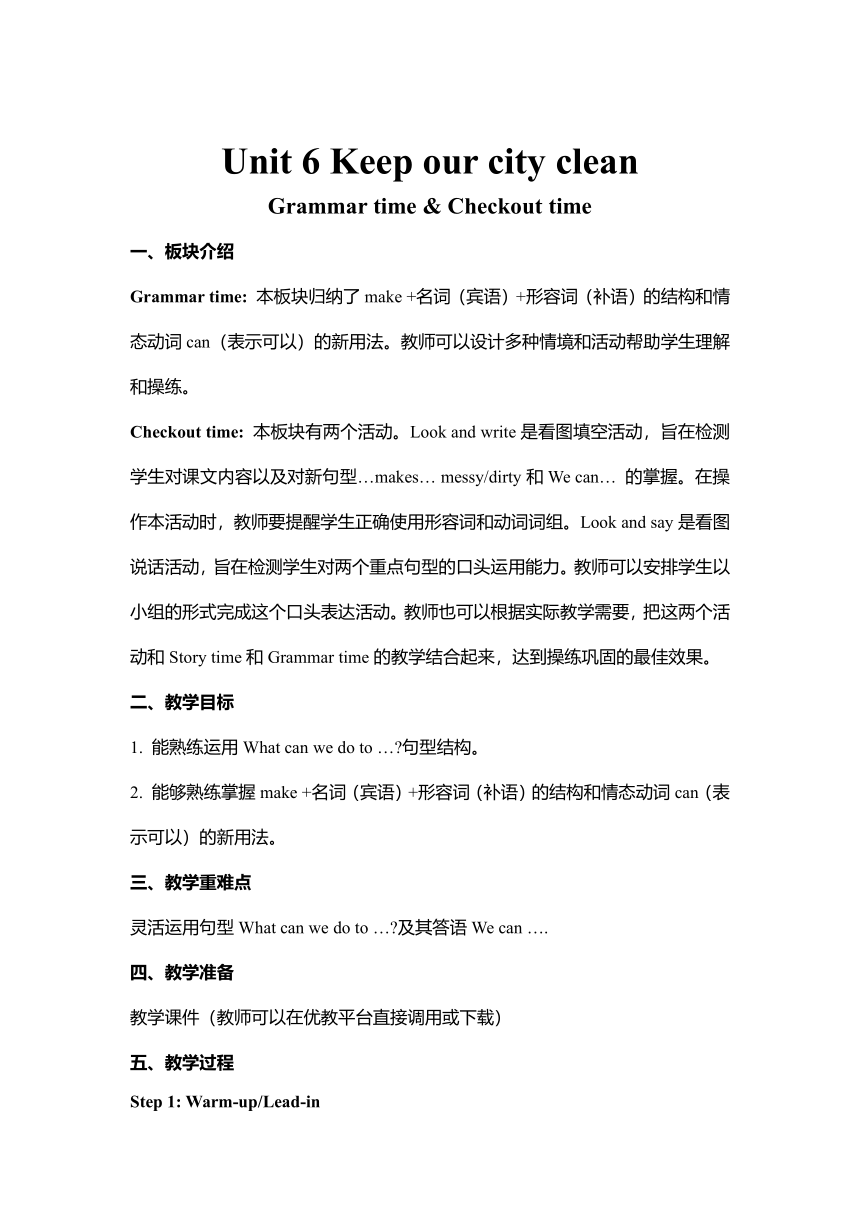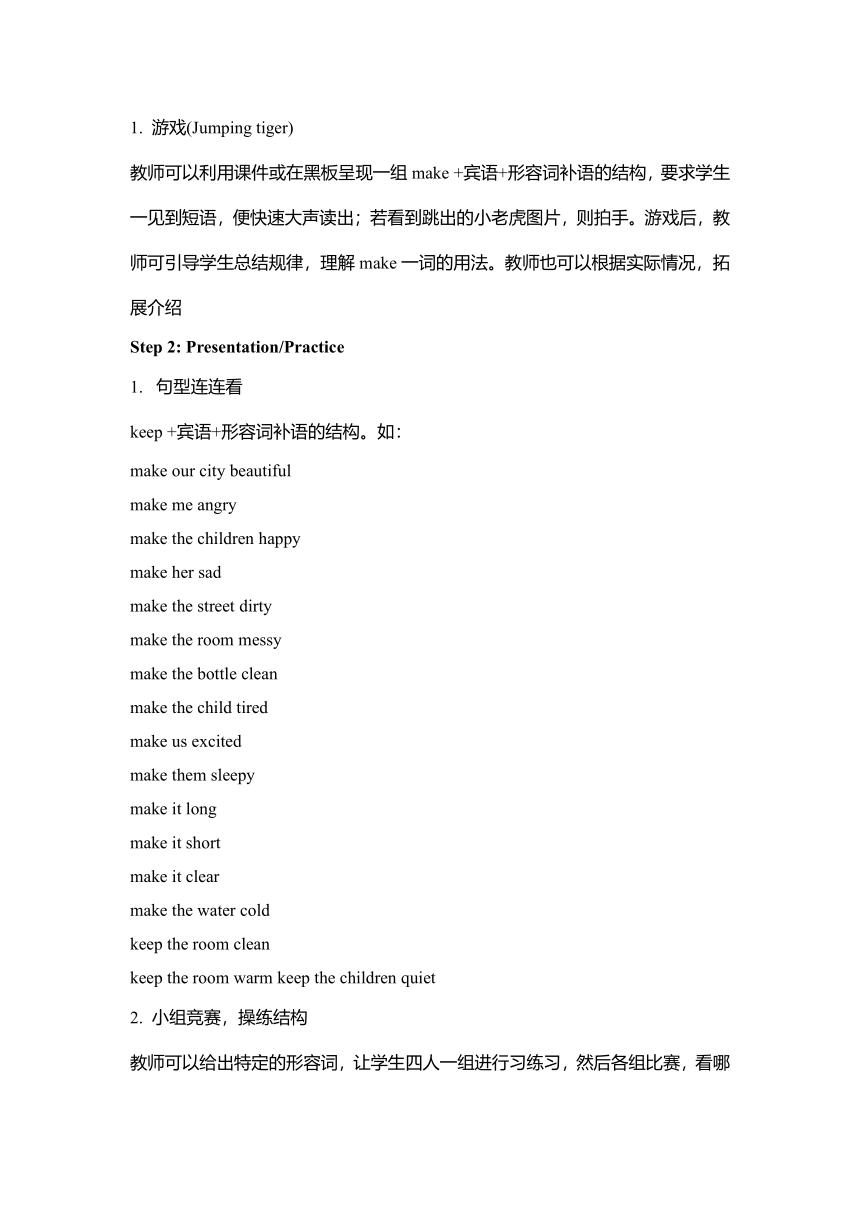Unit 6 Keep our city clean-Grammar time & Checkout time 教案
文档属性
| 名称 | Unit 6 Keep our city clean-Grammar time & Checkout time 教案 |  | |
| 格式 | zip | ||
| 文件大小 | 19.1KB | ||
| 资源类型 | 教案 | ||
| 版本资源 | 牛津译林版 | ||
| 科目 | 英语 | ||
| 更新时间 | 2021-07-31 18:50:50 | ||
图片预览


文档简介
Unit
6
Keep
our
city
clean
Grammar
time
&
Checkout
time
一、板块介绍
Grammar
time:
本板块归纳了make
+名词(宾语)+形容词(补语)的结构和情态动词can(表示可以)的新用法。教师可以设计多种情境和活动帮助学生理解和操练。
Checkout
time:
本板块有两个活动。Look
and
write是看图填空活动,旨在检测学生对课文内容以及对新句型…makes…
messy/dirty和We
can…
的掌握。在操作本活动时,教师要提醒学生正确使用形容词和动词词组。Look
and
say是看图说话活动,旨在检测学生对两个重点句型的口头运用能力。教师可以安排学生以小组的形式完成这个口头表达活动。教师也可以根据实际教学需要,把这两个活动和Story
time和Grammar
time的教学结合起来,达到操练巩固的最佳效果。
二、教学目标
1.
能熟练运用What
can
we
do
to
…?句型结构。
2.
能够熟练掌握make
+名词(宾语)+形容词(补语)的结构和情态动词can(表示可以)的新用法。
三、教学重难点
灵活运用句型What
can
we
do
to
…?及其答语We
can
….
四、教学准备
教学课件(教师可以在优教平台直接调用或下载)
五、教学过程
Step
1:
Warm-up/Lead-in
1.
游戏(Jumping
tiger)
教师可以利用课件或在黑板呈现一组make
+宾语+形容词补语的结构,要求学生
一见到短语,便快速大声读出;若看到跳出的小老虎图片,则拍手。游戏后,教师可引导学生总结规律,理解make一词的用法。教师也可以根据实际情况,拓展介绍
Step
2:
Presentation/Practice
句型连连看
keep
+宾语+形容词补语的结构。如:
make
our
city
beautiful
make
me
angry
make
the
children
happy
make
her
sad
make
the
street
dirty
make
the
room
messy
make
the
bottle
clean
make
the
child
tired
make
us
excited
make
them
sleepy
make
it
long
make
it
short
make
it
clear
make
the
water
cold
keep
the
room
clean
keep
the
room
warm
keep
the
children
quiet
2.
小组竞赛,操练结构
教师可以给出特定的形容词,让学生四人一组进行习练习,然后各组比赛,看哪个小组给出的词组最多。如:
make
____________________
beautiful
make
____________________
clean
make
____________________
happy
make
____________________
dirty
…
G1:
make
the
room
beautiful
make
the
picture
beautiful
make
the
Christmas
tree
beautiful
make
the
card
beautiful
make
the
city
beautiful
…
G2:
make
the
desk
clean
make
the
bed
clean
make
the
living
room
clean
make
the
city
clean
make
the
river
clean
3.
快问快答
教师和学生进行快回快答活动,巩固make
...
dirty/clean/beautiful/...结构。如:
T:
What
makes
the
air
dirty?
Ss:
Smoke
from
factories
makes
the
air
dirty.
T:
What
makes
the
street
dirty?
Ss:
Rubbish
makes
the
street
dirty.
T:
What
makes
our
city
beautiful?
Ss:
Trees
make
our
city
beautiful.
…
4.
Magic
eyes
教师利用课件随机闪现Plant
trees,
Put
rubbish
in
the
bin,
take
the
bus,
take
the
metro
walk
to
school,
pick
up
the
bottles等对环境有利的行为图片和throw
rubbish
in
the
river,
cut
down
trees,
put
rubbish
in
the
river等破坏环境的行为图片。学生看到图片时要大声说出相应的动词短语,并做出相应手势,以判断该行为是否有助于环境保护。如果图片内容是有助于环境保护的,则拍手两下;如果图片内容是破坏环境的,则双手交叉放在胸前。如:
Ss:
Take
the
metro.
(拍手两下)
Ss:
Throw
rubbish
into
the
river.
(双手交叉在胸前)
Step
3:
Consolidation
接龙游戏,操练情态动词can
教师可以组织学生以小组接龙的方式为保持城市整洁提出自己的建议。教师也可
以要求学生思考如何保持学校、教室、图书馆或者其他公共场所的清洁。如:
S1:
What
can
you
do
to
keep
our
city
clean?
S2:
I
can
take
the
bus
to
school.
What
can
you
do
to
keep
our
city
clean?
S3:
I
can
walk
to
school.
What
can
you
do
to
keep
our
city
clean?
S4:
We
can
move
some
factories
away
from
our
city.
What
can
you
do
to
keep
our
city
clean?
Step
4:
Summary
句型:---What
makes
…?
---
…makes
…
make
+名词(宾语)+形容词(补语)
Step
5:
Homework
情态动词Can的造句(至少5个)。
Look
and
write
参考答案
1.
messy,
clothes,
toys
2.
dirty,
messy,
put
the
rubbish
3.
dirty,
messy,
sweep,
clean
4.
dirty,
move
some
factories
Look
and
say
参考答案
The
dirty
clothes
make
the
sofa
messy.
The
rubbish
makes
the
table
dirty
and
messy.
The
toys,
the
socks,
the
books,
the
crayons
and
the
rubbish
make
the
floor
dirty
and
messy.
To
keep
the
room
clean,
we
can
put
the
dirty
clothes
in
a
box
or
a
basket.
We
can
put
the
toys
in
the
box
too.
We
can
put
the
books
and
the
crayons
in
the
schoolbag.
We
can
put
the
rubbish
in
the
bin.
We
can
also
sweep
the
floor
and
clean
the
table.
6
Keep
our
city
clean
Grammar
time
&
Checkout
time
一、板块介绍
Grammar
time:
本板块归纳了make
+名词(宾语)+形容词(补语)的结构和情态动词can(表示可以)的新用法。教师可以设计多种情境和活动帮助学生理解和操练。
Checkout
time:
本板块有两个活动。Look
and
write是看图填空活动,旨在检测学生对课文内容以及对新句型…makes…
messy/dirty和We
can…
的掌握。在操作本活动时,教师要提醒学生正确使用形容词和动词词组。Look
and
say是看图说话活动,旨在检测学生对两个重点句型的口头运用能力。教师可以安排学生以小组的形式完成这个口头表达活动。教师也可以根据实际教学需要,把这两个活动和Story
time和Grammar
time的教学结合起来,达到操练巩固的最佳效果。
二、教学目标
1.
能熟练运用What
can
we
do
to
…?句型结构。
2.
能够熟练掌握make
+名词(宾语)+形容词(补语)的结构和情态动词can(表示可以)的新用法。
三、教学重难点
灵活运用句型What
can
we
do
to
…?及其答语We
can
….
四、教学准备
教学课件(教师可以在优教平台直接调用或下载)
五、教学过程
Step
1:
Warm-up/Lead-in
1.
游戏(Jumping
tiger)
教师可以利用课件或在黑板呈现一组make
+宾语+形容词补语的结构,要求学生
一见到短语,便快速大声读出;若看到跳出的小老虎图片,则拍手。游戏后,教师可引导学生总结规律,理解make一词的用法。教师也可以根据实际情况,拓展介绍
Step
2:
Presentation/Practice
句型连连看
keep
+宾语+形容词补语的结构。如:
make
our
city
beautiful
make
me
angry
make
the
children
happy
make
her
sad
make
the
street
dirty
make
the
room
messy
make
the
bottle
clean
make
the
child
tired
make
us
excited
make
them
sleepy
make
it
long
make
it
short
make
it
clear
make
the
water
cold
keep
the
room
clean
keep
the
room
warm
keep
the
children
quiet
2.
小组竞赛,操练结构
教师可以给出特定的形容词,让学生四人一组进行习练习,然后各组比赛,看哪个小组给出的词组最多。如:
make
____________________
beautiful
make
____________________
clean
make
____________________
happy
make
____________________
dirty
…
G1:
make
the
room
beautiful
make
the
picture
beautiful
make
the
Christmas
tree
beautiful
make
the
card
beautiful
make
the
city
beautiful
…
G2:
make
the
desk
clean
make
the
bed
clean
make
the
living
room
clean
make
the
city
clean
make
the
river
clean
3.
快问快答
教师和学生进行快回快答活动,巩固make
...
dirty/clean/beautiful/...结构。如:
T:
What
makes
the
air
dirty?
Ss:
Smoke
from
factories
makes
the
air
dirty.
T:
What
makes
the
street
dirty?
Ss:
Rubbish
makes
the
street
dirty.
T:
What
makes
our
city
beautiful?
Ss:
Trees
make
our
city
beautiful.
…
4.
Magic
eyes
教师利用课件随机闪现Plant
trees,
Put
rubbish
in
the
bin,
take
the
bus,
take
the
metro
walk
to
school,
pick
up
the
bottles等对环境有利的行为图片和throw
rubbish
in
the
river,
cut
down
trees,
put
rubbish
in
the
river等破坏环境的行为图片。学生看到图片时要大声说出相应的动词短语,并做出相应手势,以判断该行为是否有助于环境保护。如果图片内容是有助于环境保护的,则拍手两下;如果图片内容是破坏环境的,则双手交叉放在胸前。如:
Ss:
Take
the
metro.
(拍手两下)
Ss:
Throw
rubbish
into
the
river.
(双手交叉在胸前)
Step
3:
Consolidation
接龙游戏,操练情态动词can
教师可以组织学生以小组接龙的方式为保持城市整洁提出自己的建议。教师也可
以要求学生思考如何保持学校、教室、图书馆或者其他公共场所的清洁。如:
S1:
What
can
you
do
to
keep
our
city
clean?
S2:
I
can
take
the
bus
to
school.
What
can
you
do
to
keep
our
city
clean?
S3:
I
can
walk
to
school.
What
can
you
do
to
keep
our
city
clean?
S4:
We
can
move
some
factories
away
from
our
city.
What
can
you
do
to
keep
our
city
clean?
Step
4:
Summary
句型:---What
makes
…?
---
…makes
…
make
+名词(宾语)+形容词(补语)
Step
5:
Homework
情态动词Can的造句(至少5个)。
Look
and
write
参考答案
1.
messy,
clothes,
toys
2.
dirty,
messy,
put
the
rubbish
3.
dirty,
messy,
sweep,
clean
4.
dirty,
move
some
factories
Look
and
say
参考答案
The
dirty
clothes
make
the
sofa
messy.
The
rubbish
makes
the
table
dirty
and
messy.
The
toys,
the
socks,
the
books,
the
crayons
and
the
rubbish
make
the
floor
dirty
and
messy.
To
keep
the
room
clean,
we
can
put
the
dirty
clothes
in
a
box
or
a
basket.
We
can
put
the
toys
in
the
box
too.
We
can
put
the
books
and
the
crayons
in
the
schoolbag.
We
can
put
the
rubbish
in
the
bin.
We
can
also
sweep
the
floor
and
clean
the
table.
